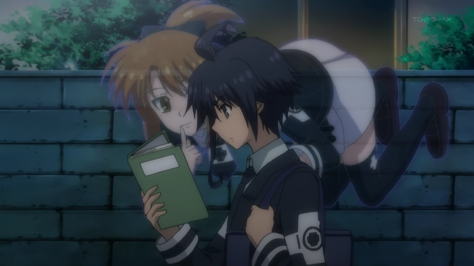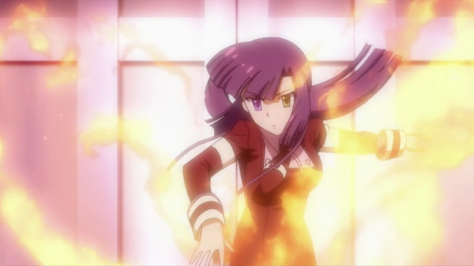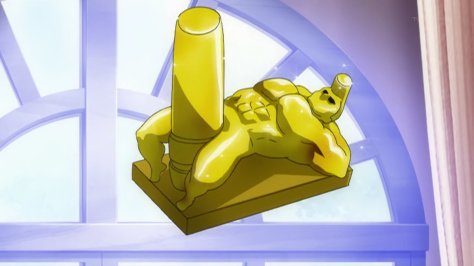Japanese Title: Asura Cryin’
Similar: A Certain Magical Index
Watched in: Japanese
Genre: Contemporary Fantasy Action
Length: 13 episodes.
Positives:
- The spell effects and mech summonings look nice.
- Well-designed and animated mechs.
- Good opening and closing sequences (that likely setup false expectations).
Negatives:
- Frame rate drop in character animation.
- A poorly setup start that quickly loses focus, ending in a weak finale.
- Generic high school side plots.
- Several androgynous characters, while pretending that they aren’t.
- Muddled lore rules.
- Many useless side characters, particularly the harem.
Asura Cryin’ is one of those shows you know is incomplete. It feels like they had a good idea and some general framework around it, but in the end too much was missing to have a solid final product. Rather than waste their time designing too many side characters, shoehorning in generic scenarios and random sleaze, they should have focused on the core concept.
Three different groups battle over a mech known as Asura Machina owned by Tomo, a wimpy high-school student. The mech is bound to him because of spirit girl Misao, who follows him around like a lost puppy. She’s still obsessed with fashion, even though she’s dead. So, Dark Society, the Divine Guards, and a demon faction all require this mech, ready to fight to the death. That is, until three episodes in where they’re all chums going on picnics, having casual chats while taking a leak…you know, the uje… Then the focus is on preventing Tomo and a demon girl Kanade (human in every way except with large fun-bags – how creative – and can use fire magic) from…getting busy…because the resulting contract plus his mech would create some powerful evil. More characters are introduced at this point – all of them female – until…they become ‘best buds’ and all’s cool despite having just tried to kill each other. Don’t confuse this with development, as no event changes these allegiances; it just happens.
More useless and irrelevant side characters enter to fill time, all the while, anyone who is relevant breaks the rules established by the world. A character’s powers seem selected at random. One has the ability to drain ‘luck’ from something by biting it (with no comprehension of how probability works); another can somehow fight these supposedly all-powerful mechs with nothing more than a sword; there’s even a guy who invents powers as he goes, and yet, somehow forgets he has them the next battle where it would be a free win. This plot doesn’t take itself seriously enough and is all over the place in its tone.
The concept and acquisition of the mechs is interesting, along with the idea of various factions vying for control over them, but beneath that, it’s just weak. For example, the demon’s mention they control the city, but this translates to nothing in the plot. Similarly, the Divine Guards work for the douchebag pope to eradicate demons; however, this too is worthless as they’re chums like no other. And Dark Society? You never see them, nor hear about them, or anything useful.
On the character front, it’s no better. Tomo and the ghost are decent enough. The Dark Society woman with glasses is a cyborg with the ability to pull guns out of nowhere (ones even bigger than her) and is a sleaze to a creepy degree. Sleaze is a common trope in this show – not to the extent that most straight up harem anime have. Kanade’s sole purpose is to pitch Tomo’s tent several times an episode; oh yes, she does fight…once.
Dialogue is hilariously bad: “It’s a forbidden existence that shouldn’t exist” – you know they were trying to be deep but failed miserably. Some forgettable girl says, “The world was created from an explosion once, correct? Well then, that means that an explosion carries with it the entirety of the world.”
Asura Cryin’ does have some redeeming qualities. The music is good, especially the opening and closing themes, accompanied by nice visuals in a heavy palette of purples and greens – this scheme translates to much of the show.
Asura Cryin’ can’t seem to avoid a dozen awful things for every one good choice in the same field. A sequel season is out for this, but I doubt I will get around to it unless requested, since I don’t see improvements on the horizon. What a waste.
Art – Medium
Animation and visual design is a mixed bag. Environments, mechs and spells look great using dark colours when necessary. The mechs remind of Warmachine’s Cygnar Warjacks, which is nothing but praise from me. A character’s shadow turning to dark matter from which the mech grows is a particularly cool effect. Where it falls is with the characters. Every male has girlish attachments to their hair, and styles are inflated. While the mechs have great animation (though at times you see more CG than anime) the characters suffer from a low frame rate in action.
Sound – Medium
I don’t know why I enjoy the opening song’s techno and ethereal lyrics – catchy. Background music consists mostly of brass instruments and violin with the occasional pipe organ, with electronic added for the action sequences. Rubbish acting.
Story – Very Low
Doesn’t know what to do with all the magic lore, supernatural factions and mecha it created. Pathetic characters.
Overall Quality – Very Low
Recommendation: Not worth your time unless you’re desperate. Asura Cryin’ needed a few more months’ incubation before being ready for production.
(Request reviews here. Find out more about the rating system here.)
Awards: (hover mouse over each award to see descriptions; click award for more recipients)
Positive: None
Negative:




















